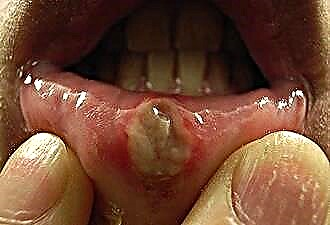The mucus in the oropharynx in humans includes the secretion of glandular cells and saliva. Normally, 80 ml of bronchial secretions and about 1.5 liters of saliva are produced daily. Excessive production of one of the components leads to the appearance of unpleasant sensations in the mouth, discomfort when talking, as well as complexes. When there is phlegm in the throat in the morning, the reasons can be roughly divided into two groups:
- respiratory tract diseases;
- digestive dysfunction;
- allergic reactions.
Upper respiratory tract diseases
 Mucus in the throat can accumulate due to its flow from the nasopharynx. The secretion produced performs the protective function of the mucous membrane, which makes it possible to reduce the negative influence of external factors.
Mucus in the throat can accumulate due to its flow from the nasopharynx. The secretion produced performs the protective function of the mucous membrane, which makes it possible to reduce the negative influence of external factors.
When dust particles get on the mucous membrane, an increased production of mucus occurs, which ensures their removal and cleaning the surface from contamination. In some cases, the mechanism of secretion production is disrupted in the direction of hyperproduction. These reasons include:
- infectious pathogens;
- allergic factors;
- high dust content in the air.
Due to the influence of provoking factors, it develops:
- rhinitis, which is characterized by inflammation of the nasal mucosa, which is manifested by rhinorrhea and nasal congestion;
- sinusitis is the occurrence of an inflammatory focus in the paranasal sinuses. Sinusitis is especially often recorded;
- nasopharyngitis is characterized by inflammation of the nasopharyngeal mucosa;
- Epiglottitis is an inflammation of the epiglottis and part of the larynx.
When an infectious or other provoking factor appears, pronounced mucus secretion is observed. Its consistency can change to a more viscous one, and in combination with amino acids, it predisposes to increased reproduction of pathogenic microorganisms.
The human olfactory organ is able to distinguish up to 10 thousand different smells, however, the increased production of mucus significantly impairs this function.
The accumulation of mucus is also facilitated by a deformed nasal septum and enlarged passages, which are congenital anatomical features or a consequence of trauma and surgery.
Sputum in the oropharynx is the result of rarefaction and the appearance of an inflammatory focus in the mucous membrane of the pharynx. Most often, the reason for this is a viral infection of the body. Symptomatically, a person feels body aches, low-grade hyperthermia, rhinorrhea, sore throat and malaise.
If the cause is a bacterial pathogen, hyperthermia can reach 39 degrees, sputum becomes yellowish, sore throat and weakness increase.
 An additional factor provoking increased mucus secretion is smoking, occupational hazards and alcoholic beverages. In this case, opportunistic flora can cause the development of a chronic disease, for example, pharyngitis:
An additional factor provoking increased mucus secretion is smoking, occupational hazards and alcoholic beverages. In this case, opportunistic flora can cause the development of a chronic disease, for example, pharyngitis:
- the catarrhal form is accompanied by a sore throat and a small amount of sputum. When bacterial microorganisms are attached, the sputum can change its color to yellow-green. If a fungal infection is observed in the nasopharynx, the color of the sputum turns white.
- for the atrophic form, the appearance of mucus is not typical, besides, a person is worried about severe dryness and sore throat due to drying out of the mucous membrane.
- hypertrophic pharyngitis is manifested by thick sputum caused by overproduction of mucus by a thickened mucous membrane. Bacterial inflammation results in yellow-green mucus.
If the inflammatory process spreads to the larynx, the patient complains of a hoarse voice, a change in its timbre and a barking cough.
Sometimes the voice can disappear altogether, then a person has to speak in a whisper.
Mucus in children in most cases is secreted with adenoiditis (proliferation of the nasopharyngeal tonsil of an inflammatory nature)
at an older age - due to chronic tonsillitis.
Digestive dysfunction
In some cases, mucus in the throat can be the result of hypersalivation and diseases of the digestive tract. Among the reasons that predispose to excessive secretion of the secretion of the salivary glands, it is worth highlighting:
- irritation of the mucous membrane with infectious and inflammatory reactions that develop against the background of dental diseases (stomatitis, gingivitis), as well as pathologies of the larynx (pharyngitis, tonsillitis). In this case, the toxins released during the vital activity of pathogenic microbes irritate the salivary glands, increasing the production of secretions.
- pathologies of the digestive system of an inflammatory nature (gastritis), gastropathy, as well as increased acidity of gastric juice increase
 the risk of excessive saliva production. Hypersalivation increases with the progression of diseases of the digestive tract.
the risk of excessive saliva production. Hypersalivation increases with the progression of diseases of the digestive tract. - the irritating effect on the salivary glands can be caused by braces and dentures that do not match the characteristics of the dentition. As a result, the patient complains of discomfort when chewing, talking, as he feels a foreign object in the mouth, as well as excessive salivation.
- mumps, which is an inflammatory process in the parotid glands. As a result, there is an increased production of saliva. The glandular tissue becomes enlarged due to edema, so the face appears to be puffy.
- neurological disorders that are caused by central damage to the nervous system or irritation of the vagus nerve. Such pathological conditions are observed in Parkinson's disease, in the post-traumatic period after traumatic brain injury, in cerebral palsy and other neurological diseases, when the control over salivation is impaired.
- endocrine dysfunction, such as thyroid disease, can cause hypersalivation. In addition, a similar symptom can be a manifestation of pancreatic diseases.
- long-term use of medications that can have an effect on the secretory work of the salivary glands. Among these drugs, it is worth highlighting cardiac glycosides, pilocarpine and proserin.
- smoking, alcohol abuse has a discharging effect on the oral mucosa and salivary glands, thereby increasing the production of saliva.
As for diseases of the digestive system, gastroesophageal reflux disease and diverticula of the esophagus should be noted. With this disease, the contents of the stomach are thrown into the esophagus and pharynx, which provokes the appearance of heartburn and hypersalivation. This is due to irritation of the oropharyngeal mucosa by acidic gastric masses. In the presence of a diverticulum, it is possible that food passes through the esophagus, which retains food debris in the esophagus, provoking heartburn and increased production of saliva.
Allergic reactions
The human body is more or less prone to the development of allergic reactions. Depending on the reactivity of the immune system, substances such as dust, fluff, pollen or wool can trigger the production of antibodies and the development of allergies.
When an allergen enters the surface of the mucous membrane of the upper respiratory tract, the body begins to produce immunoglobulins, which combine with basophils, as well as mast cells. As a result, a complex is formed from immunoglobulin, cells and allergen.With repeated contact, histamine is released, which initiates the development of an allergic reaction.
Thus, vascular dilation occurs, which in turn helps to reduce blood pressure, the release of fluid from a part of the blood from the vascular bed into the tissue. The result is swelling and mucus in the throat, which indicates an allergic pharyngopathy.
A predisposition to allergies can be transmitted genetically or be due to the individual characteristics of the human immune system. Allergy symptoms depend on the site of introduction of the allergen, so they can manifest themselves:
- itchy skin, rashes;
- bronchospasm, cough, shortness of breath;
- rhinorrhea, lacrimation, sneezing;
- itching in the nose, eyes;
- dyspeptic disorders.
In some cases, anaphylactic shock develops, which is characterized by a sharp drop in blood pressure, severe shortness of breath, increased heart rate, swelling of the throat, generalized skin rash and malaise up to loss of consciousness.
Preventive actions
To reduce mucus in the throat or completely avoid its increased production, it is recommended to adhere to some tips:
- quit smoking, a large amount of alcoholic beverages;
- refuse hot spices, dishes, pickles that irritate the mucous membrane of the digestive tract, in particular, the oropharynx;

- avoid dry water, daily drinking volume should not be less than 1.5-2 liters;
- a nutritious diet should be enriched with vegetables, fruits, cereals, dairy products, fish and other healthy foods. At the same time, one should not abuse fatty, fried foods, carbonated drinks;
- taking all medications should be monitored by a doctor (dose, duration of the therapeutic course);
- food intake should be daily at approximately the same time, the intervals between meals should not exceed 4 hours;
- while eating, you should chew food thoroughly, do not drink it with water;
- avoid contact with sick people with infectious diseases;
- avoid visiting public places during an epidemic;
- dress warmly in winter;
- avoid drafts;
- regularly ventilate the room, carry out wet cleaning;
- humidify the air in the room;
- walk regularly in ecologically clean areas (park, forest, coastal areas);
- consult a dentist for the correction of braces, dentures, treatment of caries, gingivitis and other infectious diseases of the oral cavity;
- strengthen immunity (sports, hardening, vitamins, sea or forest air).
The listed recommendations help prevent the development of inflammatory processes in the nasopharynx and oropharynx, as well as reduce the risk of digestive dysfunction.
If, nevertheless, there are signs of inflammation in the throat, you should start rinsing with solutions with antimicrobial, anti-inflammatory, decongestant and analgesic effects.
For this, a soda-salt solution, decoctions of herbs (chamomile, oak bark, sage) or pharmaceutical medicinal rinsing solutions, for example, Furacillin, Rotokan, Chlorhexidine or Miramistin, are suitable.
To rinse the nasal cavity, Aqua Maris, No-salt and other preparations based on sea water are used. To combat infectious pathogens with sinusitis, the use of Polydex is shown.
Given the wide range of possible causes of mucus in the throat, you should not try to solve this problem yourself. It is necessary to consult a doctor for examination and taking measures to eliminate the unpleasant symptom.

 the risk of excessive saliva production. Hypersalivation increases with the progression of diseases of the digestive tract.
the risk of excessive saliva production. Hypersalivation increases with the progression of diseases of the digestive tract.


